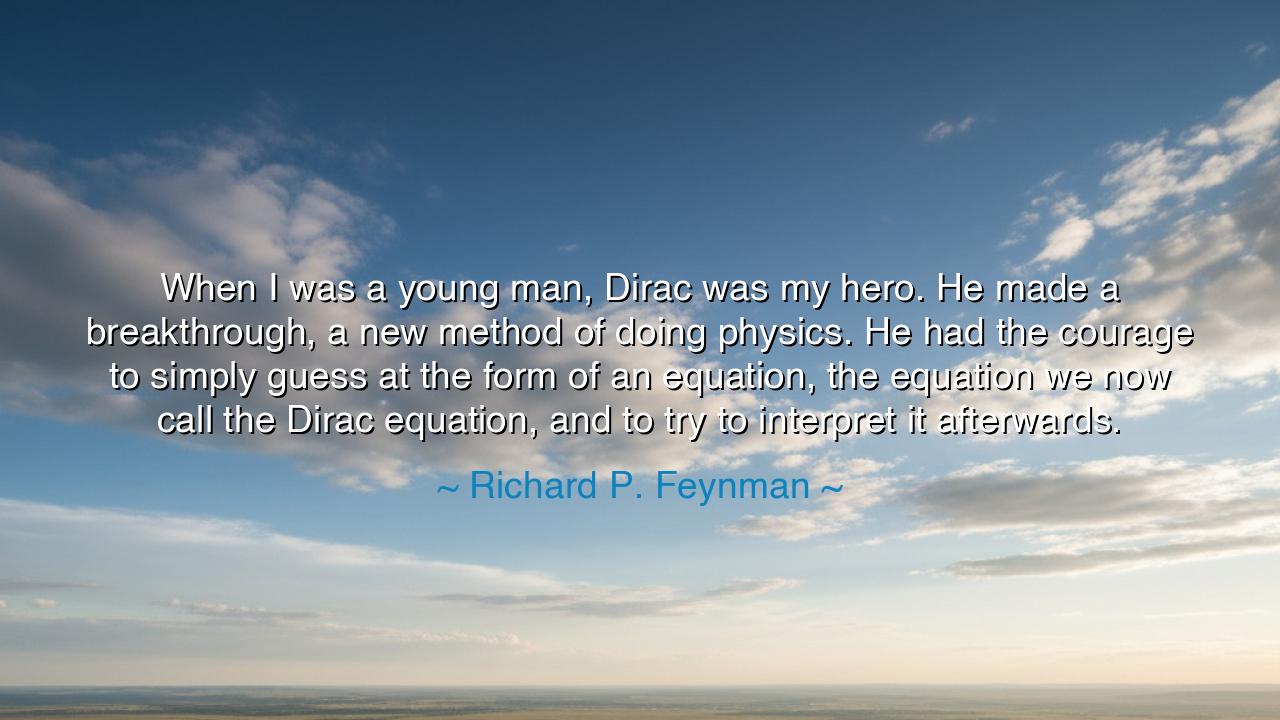
When I was a young man, Dirac was my hero. He made a
When I was a young man, Dirac was my hero. He made a breakthrough, a new method of doing physics. He had the courage to simply guess at the form of an equation, the equation we now call the Dirac equation, and to try to interpret it afterwards.






“When I was a young man, Dirac was my hero. He made a breakthrough, a new method of doing physics. He had the courage to simply guess at the form of an equation, the equation we now call the Dirac equation, and to try to interpret it afterwards.” Thus spoke Richard P. Feynman, the magician of modern physics, whose mind danced between the realms of matter and imagination. In his reverence for Paul Dirac, we glimpse not merely admiration for a man, but for a way of seeing — for the boldness to leap into the unknown guided only by faith in beauty and reason. These words are not only about science; they are about the courage of creation, the sacred daring to give shape to mystery before one fully understands it.
In the ancient sense, such courage belongs to the heroes of both thought and spirit. Just as the warrior faces battle without certainty of victory, the thinker faces the infinite without assurance of truth. Dirac, in his time, looked upon the tangled wilderness of quantum theory and relativity and did not flinch. Instead, he trusted intuition — that deep whisper of the universe speaking through the human mind — and guessed the form of an equation that would later reveal the hidden symmetries of nature. His Dirac equation united worlds: matter and energy, light and shadow, existence and annihilation. In that single act of insight, he uncovered the very foundations of antimatter — a discovery born not of logic alone, but of faith in beauty.
Feynman, who himself would become a legend, looked upon this act as a sacred example. “He had the courage to guess,” Feynman said — and those words resound like an ancient teaching. For in the realm of discovery, knowledge alone is not enough. There must be imagination, and above imagination, courage — the courage to err, to be wrong, to venture where reason trembles. The ancients knew this as the virtue of the seeker: to stand at the edge of understanding and step forward into mystery. Dirac did not wait for the path to be lit; he lit it himself by daring to move.
Consider, for a moment, the echo of this same spirit in Christopher Columbus, who set sail into the western sea not knowing whether land awaited him. Or in Marie Curie, who pursued the invisible forces of radioactivity, guided by intuition and patience, long before science had words for what she sought. These souls shared the same audacity of inquiry that Feynman admired in Dirac — the willingness to act before certainty, to follow beauty even when the destination is hidden. And so, whether in the quest for continents or for equations, the same law holds true: progress belongs to the brave.
Feynman’s own life reflected this creed. He would later invent new languages of physics — Feynman diagrams, quantum electrodynamics — by daring to think differently, to “guess and see.” For him, Dirac’s courage was not just inspiration; it was a blueprint. He understood that to guess is not to gamble blindly, but to trust one’s creative spirit — to sense the harmony beneath chaos and reach for it. The Dirac equation was not born from calculation alone; it was born from an act of faith that beauty and truth are kin.
This quote, then, is more than an homage; it is a teaching for every seeker of truth. Whether one studies the stars or the soul, the principle is the same: do not fear the unknown. To create, one must first leap. The mind that waits for perfect understanding will never move beyond the known, but the heart that dares to guess — and then works to understand — becomes a bridge between ignorance and revelation.
The lesson is eternal: knowledge follows courage, not the other way around. Let your intellect be sharp, but let your heart be bold. In every field — in art, in science, in life — there will come moments when reason alone cannot guide you. In those moments, remember Dirac, and remember Feynman’s words. Dare to guess, dare to dream, dare to act — and let understanding come afterwards. For it is the brave who shape the future, the seekers who guess at truth, and the humble who interpret the divine music of the universe long after they have dared to play its first note.






AAdministratorAdministrator
Welcome, honored guests. Please leave a comment, we will respond soon